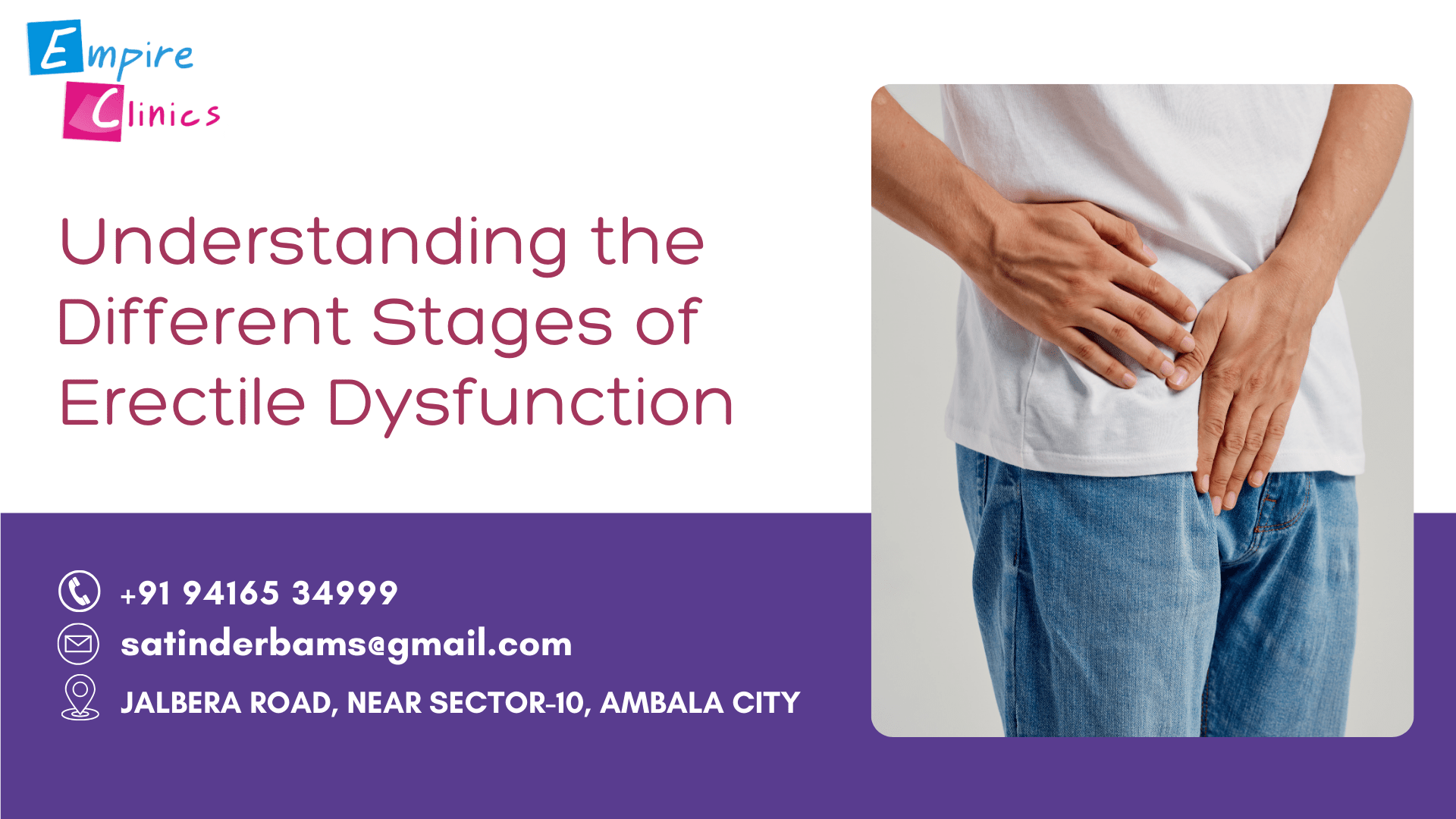Erectile dysfunction (ED) is a common condition that affects men of all ages. It can range from occasional difficulties getting or maintaining an erection to a more persistent issue. Understanding the different stages of erectile dysfunction can help you identify where you stand and seek appropriate treatment. This guide will walk you through the various stages of ED, their causes, and what you can do to manage them.
Table of Contents
What is Erectile Dysfunction?
Erectile dysfunction occurs when a man has difficulty achieving or maintaining an erection firm enough for sexual intercourse. It’s important to note that occasional trouble with erections is normal and not always a cause for concern. However, if the problem is ongoing, it may be a sign of ED.
The Various Stages of Erectile Dysfunction
Erectile dysfunction can be classified into different stages based on the frequency and severity of the symptoms. Let’s explore these stages:
1. Stage: Occasional Erectile Dysfunction
- Description: In this stage, a man may experience difficulty getting or keeping an erection from time to time, but this happens infrequently. It’s often linked to stress, fatigue, or temporary factors such as alcohol consumption.
- Causes: Temporary lifestyle factors like stress, anxiety, or alcohol use are often the main causes at this stage. It’s not usually a medical concern if the issue resolves on its own.
- Management: Relaxation techniques, reducing alcohol intake, and addressing any immediate sources of stress can help improve erections at this stage. No medical treatment is typically required.
2. Stage: Mild Erectile Dysfunction
- Description: At this stage, erectile problems occur more frequently, but erections are still possible most of the time. Men may find it harder to achieve a firm erection consistently.
- Causes: Factors like increased stress, anxiety, early signs of cardiovascular issues, or unhealthy lifestyle habits such as poor diet and lack of exercise may contribute.
- Management: Lifestyle changes such as exercising regularly, eating a healthy diet, quitting smoking, and managing stress can help. In some cases, talking to a healthcare provider about the issue may be necessary.
3. Stage: Moderate Erectile Dysfunction
- Description: In moderate erectile dysfunction, men often struggle to maintain an erection firm enough for sexual activity. The problem occurs more regularly, and it may start affecting self-confidence and relationships.
- Causes: Health conditions like high blood pressure, diabetes, obesity, and hormone imbalances (like low testosterone) are common causes at this stage. Psychological factors such as depression or relationship issues can also contribute.
- Management: Medical treatments such as oral medications (e.g., Viagra or Cialis), therapy, or addressing underlying health conditions may be necessary. Consulting a doctor is essential for proper diagnosis and treatment.
4. Stage: Severe Erectile Dysfunction
- Description: At this stage, getting an erection is extremely difficult or impossible, even with sexual stimulation. This may indicate a more serious underlying health condition.
- Causes: Severe ED is often caused by advanced health issues such as heart disease, severe diabetes, nerve damage, or hormonal disorders. Long-term psychological conditions, certain medications, or damage from surgery can also lead to this stage.
- Management: At this stage, medical intervention is crucial. Treatments may include prescription medications, hormone therapy, vacuum erection devices, or even surgical options like penile implants. A healthcare provider can help determine the best course of action.
Causes of Erectile Dysfunction at Different Stages
Erectile dysfunction can be caused by various physical and psychological factors, including:
- Cardiovascular issues: High blood pressure, heart disease, and poor circulation can all affect blood flow to the penis.
- Diabetes: This condition can damage nerves and blood vessels, leading to ED.
- Hormonal imbalances: Low testosterone levels can reduce libido and lead to erectile problems.
- Medications: Certain drugs, such as antidepressants or blood pressure medications, can interfere with erectile function.
- Psychological factors: Stress, anxiety, depression, and relationship problems can all contribute to ED.
How to Identify Your Stage of Erectile Dysfunction
Identifying the stage of your ED can help you and your healthcare provider determine the best treatment options. Here’s how you can assess your stage:
- Frequency of Erectile Problems: How often do you have trouble getting or keeping an erection? Occasional issues are common, but frequent difficulties may indicate a more serious problem.
- Severity of Symptoms: Are your erections not firm enough for sexual activity, or are you unable to get an erection at all?
- Impact on Relationships: Is your ED affecting your confidence or your relationship with your partner? This emotional aspect can help determine how severe the problem is.
- Underlying Health Issues: Do you have any chronic conditions like diabetes, heart disease, or hormonal imbalances that could be contributing to the problem?
Treatment Options for Erectile Dysfunction
Depending on the stage of ED, different treatments may be recommended:
- Lifestyle Changes: Regular exercise, a balanced diet, quitting smoking, and reducing alcohol intake can improve symptoms, especially in the early stages.
- Medications: Oral medications like sildenafil (Viagra), tadalafil (Cialis), or vardenafil (Levitra) are often prescribed for moderate ED.
- Therapy: Psychological counseling or couples therapy can help address the emotional and mental factors contributing to ED.
- Medical Devices: Devices like vacuum erection pumps can assist in getting an erection.
- Surgical Options: In severe cases, penile implants or vascular surgery may be recommended.
When to See a Doctor
If you notice persistent problems with erections that are affecting your quality of life, it’s important to consult a doctor. Early diagnosis and treatment can improve your sexual health and prevent the issue from progressing to a more severe stage.
Have any Question about Erectile dysfunction, Contact Now
Erectile dysfunction can range from occasional difficulties to more serious issues. By understanding the stages of ED and seeking help when needed, you can effectively manage the condition and improve your quality of life. Don’t hesitate to speak with a healthcare provider if you’re concerned about your symptoms.







